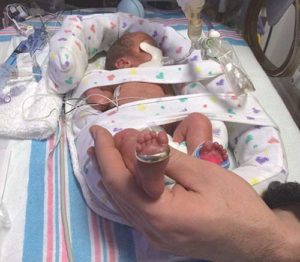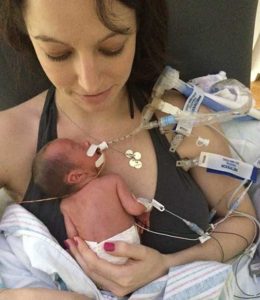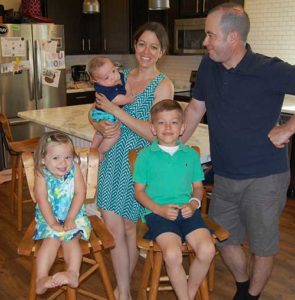MILWAUKEE — The McKeown family’s life was changed forever in December 2015. It changed from the idyllic happiness awaiting the spring birth of their third baby to the beginning of a long, challenging medical journey for two family members.

Born at 26.5 weeks gestation, Max McKeown weighed 2.3 pounds – so small the wedding ring of his father, Patrick, encircled his foot. He spent 97 days in the neonatal intensive care unit at Aurora Women’s Pavilion, West Allis. (Submitted photo courtesy Patrick McKeown)
Keegan McKeown went to Aurora Women’s Pavilion in West Allis, where she works as a labor and delivery nurse, for a routine sonogram. Her husband, Patrick, was teaching social studies at St. Sebastian School, Milwaukee. Her oldest child Patrick, who they call Paddy, was in kindergarten at St. Eugene School, Fox Point. With no one else to watch 2-year-old Marie, Keegan brought her to the appointment.
Roughly 25 weeks into her pregnancy, she was told by her doctor she needed to be put on bed rest immediately because “the baby could come today, we don’t know.”
When describing how she felt when she heard the news, Keegan said, “Panic.”
“I’m a delivery nurse, so I’m going down to the floor that I work on and I deliver babies like this all the time, and I trust my co-workers to help me through everything,” Keegan said. “But I know what’s coming … I know way too much. I’ve seen way too many babies die.”
Keegan called Patrick twice. No answer. She texted him “Call me now.” Eventually he called back and left St. Sebastian to be at his wife’s side.
“The whole way there I was holding on to the rosary that’s hanging from our rearview mirror,” Patrick said, remembering what he felt when he walked into the hospital. “It was a relief just to see her, because she’s OK. But then reality sets in.”
Carrie Keyse, a registered nurse at the Aurora Women’s Pavilion, and Keegan became friends while working together in labor and delivery.
Nurse becomes patient
“Her patients love her because she’s so caring and great at what she does,” Keyse told the Catholic Herald. “She and I naturally became friends … our kids are pretty much the same age; our husbands are both teachers.”
Keegan suddenly became one of Keyse’s patients.

One hand is all it took for Keegan McKeown to hold Max McKeown shortly after his birth. The infant was born some 14 weeks early and weighed only 2.3 pounds. (Submitted photo by Patrick McKeown)
“Being an experienced labor and delivery nurse, both of us knew what the situation could end up being, like worst case scenario,” Keyse said, adding Keegan was used to being on her feet; being put on bed rest was a dramatic change. “It was hard for her to be a patient on our unit.”
Keegan and Patrick described the days of bed rest as a “rollercoaster.” They said things would seem fine in the morning, so Patrick would go to work. By afternoon, they thought the baby was coming. Then at night, it seemed fine again.
This went on for a week and it had its effect on Keegan and Patrick.
“My son is sitting at my bedside and he’s singing me all these Christmas carols that he was going to sing at the Christmas concert that I’m going to miss. His first one,” Keegan said. “He’s just sweetly singing to me, then he’s leaving.”
On Dec. 10, the call came – the baby is coming.
Focus is safe birth
Dr. Rashmi Kaul had worked closely with Keegan for the three years she’s been at Aurora.
“She’s a great labor and delivery nurse,” Kaul said. “She’s probably one of my favorite nurses.”
Kaul treated Keegan during the pregnancy and although she was confident of her medical decisions, she said her relationship with Keegan affected her decision making.
“I found myself weighing my decisions a little bit more,” Kaul said. “That is sometimes the downfall of treating people that you know, because you’re not treating it as a black and white situation; you’re treating it like a gray situation.”
It wasn’t unusual, Kaul said, for her to think hard about her medical decisions, but this case was different.
“It’s one of your own,” Kaul said. “It’s like going to war. You worry about your soldiers and you want them to be doing well emotionally.”
As Keegan went into labor, Kaul was focused on getting the baby out safely. In her experience, Kaul said, the delivery process is different for premature babies than full-term.
“You want to make sure it’s the least traumatic delivery for the baby in terms of physical trauma, because at that point the babies are really, really small,” Kaul said. “Their bones are really fragile. Their heads are really fragile.”
Baby Max arrives
While Keegan was on bed rest, the couple settled on a name for the baby – Maximilian. They call him Max. While checking on Max, the doctors realized the embilical cord was wrapped around his neck and they did an emergency Cesarean section. As Max was delivered, Patrick prepared for the worst.

The McKeown family poses for a photo in their home, June 21. Pictured are Patrick and Keegan with their children, Marie, left to right, Max and Paddy. The scar on Patrick’s head from surgery to address melanoma is visible. (Catholic Herald photo by Ricardo Torres)
“He comes out and he’s not making any noise. I hear the anesthesiologist whispering to someone else and I’m thinking, ‘All right, he’s dead. That’s it.’ I was so prepared for something so awful and I didn’t know what to expect,” Patrick said. “They couldn’t find the baby’s heart rate before they started and immediately I’m thinking, ‘The baby is dead.’”
The anxiety was thick in the delivery room.
“He was little,” Keyse said. “They had some trouble intubating him at first so it’s scary … every second seems like an hour when it’s happening.”
Kaul said the delivery was a success for how early Max was.
“Any baby that’s 26 weeks, it’s very uncommon that they would be breathing on their own,” Kaul said. “He was moving around but he’s not going to sustain the amount of energy it would need to use its lungs.”
Max was 2.3 pounds at birth and was rushed to the neonatal intensive care unit. Patrick called Fr. Jacob Strand, then-shared associate pastor at St. Eugene, Fox Point and St. Monica, Whitefish Bay, and asked him to come to the hospital to baptize Max.
“He baptized (Max) within 20 minutes of Max being born,” Patrick said.
This wasn’t Fr. Strand’s first baptism in the hospital with the McKeown family as he also baptized Marie, who arrived about a week early.
That time, he said, Keegan was holding Marie, but this time it was a much dire situation.
“When I baptized (Max), he was in the isolette,” Fr. Strand said. “I had a bottle of blessed holy water and what I did is they let me put my hand into the isolette with the bottle and I dropped three drops of water and I said, ‘I baptize you in the name of the Father and of the Son and of the Holy Spirit,’ and that was it.”
Fr. Strand said there was a nurse crying in the room as he was going through the process.
“It’s beautiful to see the essentials happen,” the priest said, adding after he sprinkled the holy water, they said a prayer. “It shows how important the sacrament of baptism is.”
When the delivery was over, Keegan was recovering and Patrick, with money Fr. Strand had given to him, bought pizza and wine and celebrated with the nurses.
“I’m just happy the ordeal is over,” Patrick said. “He looked so healthy, I’m like, ‘OK, we’re cool, he looks fine.’”
Kaul explained that even though Max was small in comparison to a full-term baby, he was large for his gestional age.
“Max is a pretty big size for being 26 weeks,” she said. “As the days went on it made a huge difference in how well he did in the NICU.”
Kaul added that during his time in the NICU, she would check on Max “at least once a week.”
With Max being treated at the hospital where she works, Keegan only took two weeks off to recover then came back to work and to see her son. By coming back to work early, she allowed herself the time at home with Max when he was ready to leave the hospital.
“If I would calculate that out, I would have to go back to work in February and he would be coming home, and I would have no time with him after he came home,” Keegan said.
While on duty, Keegan found convenient times to see Max, such as when she conducted safety checks for all the incubators.
“I’d go and make sure all of them are locked and I’d still see him,” she said.
When Max was 2 weeks old, Keegan was finally able to hold him. To help with his recovery and breathing patterns Max would be held “skin-to-skin” against his parents’ chests.
“It was like a drug,” Keegan said, describing the feeling of holding Max. “It’s hard to describe, but you’d put the baby on and immediately you’d be the calmest ever.”
Max could only be held once a day and for two weeks mom had dibs, but four weeks after his birth, Patrick held him. Both Keegan and Patrick said they felt like “jelly” while holding him.
But it wasn’t always a euphoric experience.
“I panicked a lot in the NICU,” Keegan said.
Max had issues with his eyes, breathing and feeding. The doctors also detected a brain bleed which could be nothing or could be life changing.
Patrick said brain bleeds are graded on a one to four scale.
“They didn’t know what stage it was,” Patrick said. “Four is death, three is cerebral palsy.”
But it was a one, which meant Max was going to be OK.
After 97 days in the hospital, Max went home on March 11, one day before his actual due date. But the McKeowns had more with which to deal.
“The oxygen machine starts alarming the first night we’re here,” Patrick said.
Max was sent home with equipment that would help him get the right amount of oxygen until he’s able to completely breathe on his own.
“We have a back-up tank; that one’s malfunctioning, too,” Keegan said. “There’s no timer on it. It’s a gauge. You don’t know how much is in there.”
For Patrick, having Max at home without the safety net of a hospital was the most frightened he’d been throughout this time.
“I remember sweating … that’s when I really panicked,” Patrick said. “We got him and nothing is working.”
Normalcy returns temporarily
Eventually things began to work out and taking care of Max became easier. The McKeowns had about a week of “normalcy” before another medical challenge occurred.
Patrick scheduled an appointment with a doctor to get a wart removed from the top of his head.
“I thought it was just a little wart on my head,” Patrick said. After the wart was removed, it was tested and showed Patrick had melanoma, a skin cancer, and he needed to see an oncologist.
For Keegan, this was another moment in which, as a nurse, she knew too much.
“My first job I worked at St. Luke’s (Milwaukee), at medical respiratory ICU and we treated patients who had melanoma,” she said. “I have vivid memories of treating these patients.”
Patrick began daily treatments but the medicine made him nauseous and caused some memory loss.
“My personality went away,” Patrick said.
Keegan noticed it, too.
“He wasn’t the same. He was very flat,” she said.
This frustrated Patrick.
“I can’t be a dad. I can’t really be a husband,” he said. “I know (Keegan) has to do everything and that’s mentally hard on me and it’s hard on her and I can’t do anything about it.”
Patrick’s liver didn’t tolerate the treatment and he was switched to Yervoy, a more experimental round of immunotherapy treatment which was eventually deemed too dangerous due to an unacceptable toxicity.
In an update posted online about a month ago, Patrick wrote, “I just finished over a month of high dose steroids to counter the Yervoy effects, and they come with their own pleasantries. So in the end I am left with scans for the next five years. The great news is that I feel almost back to normal, the not so great news is I’m more in a defensive posture than an offensive one. I gave it the best shot I could with two very strong immunotherapies and feel good about what they may have accomplished. The tumor that was removed had many high risk factors and one can never really know if it will return. With proper monitoring, and prayers I am very hopeful.”
Parish, school families step in to help
While the school year was still in session, Patrick used all of his vacation time to be at the hospital with Max. Keegan was on unpaid maternity leave and was using her vacation days to bring in income. The medical bills alone soared to thousands of dollars, and that didn’t include everyday bills.
To help the family pay for the medical bills, Keegan’s mother, Barb Wickham, created a GoFundMe page with a goal of $50,000.
“We’re stunned by everyone’s support,” Patrick said. “The generosity of so many other people has taught us how generous we need to be to people.”
Patrick said they were surprised everytime they saw the number of donations on the GoFundMe page and some donations were even made in person. One in particular stands out from a friend of a friend.
“He just stopped by and gave me an envelope of money. Never met the guy. He had an envelope of cash, $1,000,” Patrick said. “I wouldn’t say we’re selfish people, but we’re certainly not generous to the point where it seems like other people are.”
As of the end of August, the GoFundMe page has raised $54,500. They also received some good news from Paddy’s school, St. Eugene, Fox Point.
“As a parish we decided to waive their school tuition for this coming year, which is about $3,800,” Fr. Jerry Herda, pastor of St. Monica and St. Eugene parishes said. “It was the least we could do as a faith community to support the McKeown family at this time.”
St. Sebastian Parish, Milwaukee, also created a policy for the school and parish in the wake of this ordeal with Patrick, which allowed employees with more than 30 vacation days the option to give up to three vacation days to an employee in an extreme situation.
“I would’ve been unpaid for 28 out of 198 days and on a Catholic school salary that’s a lot of days,” Patrick said, adding his co-workers donated 14 days to him. He is again teaching at the school.
Max is six-months old and weighs 15 pounds and is only on oxygen when he sleeps.
“He’s the smiliest baby of all time,” Patrick said. “I’m telling you he smiles, 100 maybe 400 times a day. More than both our other kids combined.”
Keegan said the series of traumatic events their family has suffered has had a positive impact.
“I think it’s definitely brought us closer,” she said. “We were really busy, getting caught up in the day-to-day prior to this … you want to take advantage of every moment.”
Patrick said these recent months have been some of the best they’ve had as a family.
“It’s forced us to slow down,” he said. “This might be the only time that we can spend this amount of time together.”
